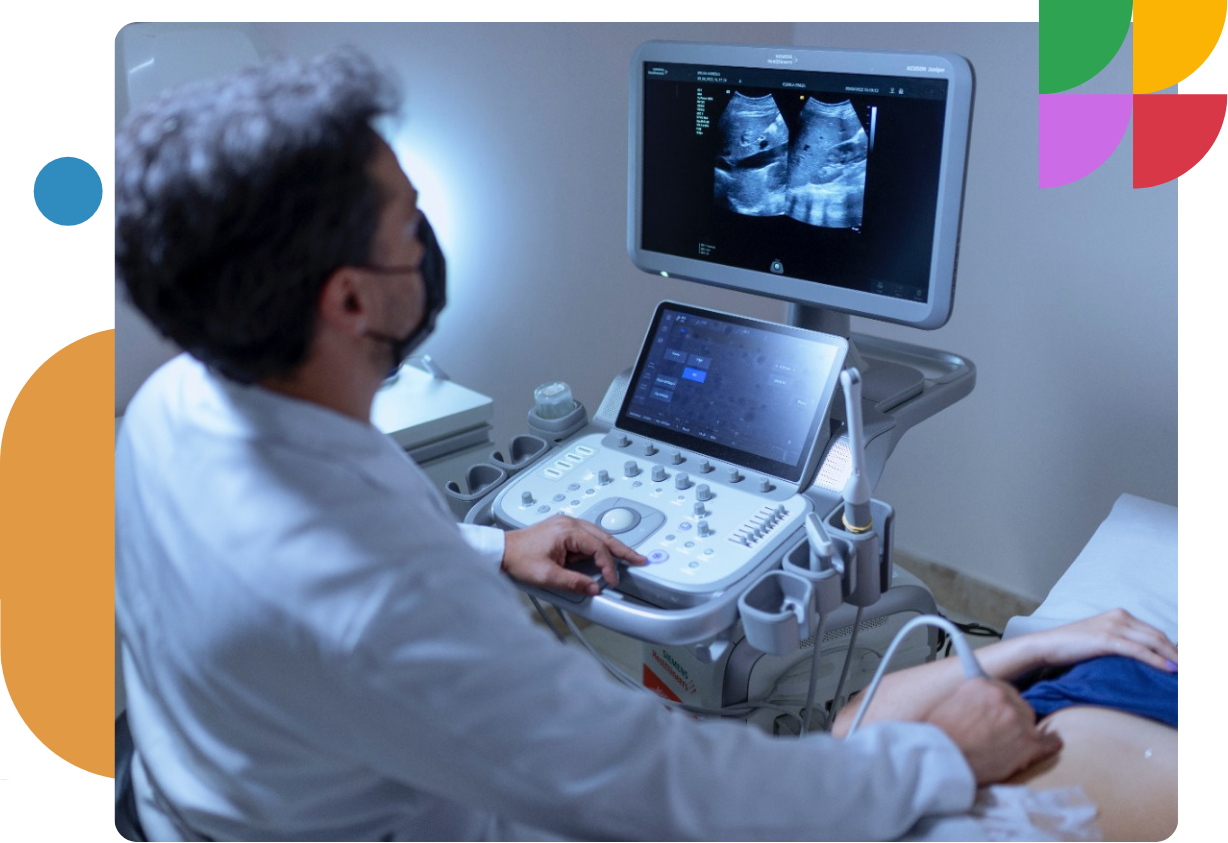facilities
Echo
This vital diagnostic tool helps in detecting heart valve problems, heart failure, congenital heart disease, and other structural abnormalities. With the expertise of Dr. C.S. Aravind, our ECHO tests provide accurate and timely diagnoses, ensuring effective treatment for a wide range of heart conditions.

At ARAVIND HEART CARE, we offer advanced Echocardiogram (ECHO) services to provide a clear, detailed look at your heart’s structure and function. An ECHO is a non-invasive ultrasound that uses high-frequency sound waves to create real-time images of your heart.
What Is an ECHO Test?
An Echocardiogram is an ultrasound-based diagnostic tool used to evaluate the heart’s chambers, valves, and overall function. By generating live images of the heart, it allows us to identify abnormalities such as improper valve function, enlarged heart chambers, or fluid around the heart (pericardial effusion). This non-invasive test is painless and typically lasts between 30 to 60 minutes.
How Is the TMT Performed?
Before starting the TMT, electrodes are placed on your chest, arms, and legs to monitor your heart’s electrical activity through an electrocardiogram (ECG). As you walk on the treadmill, the speed and incline are adjusted in stages, increasing the effort required. Throughout the test, your heart rate, blood pressure, and ECG readings are continuously monitored. The doctor will closely observe how your heart responds to the increasing workload and will stop the test if any concerning symptoms arise.
Types of Echocardiograms
At ARAVIND HEART CARE, we offer two primary types of ECHO tests:
- Transthoracic Echocardiogram (TTE): This is the most common type of ECHO, where a transducer is placed on your chest to create images of your heart.
- Transesophageal Echocardiogram (TEE): This type provides a more detailed view of the heart by inserting a probe down your esophagus, getting closer to the heart. TEE is recommended for detecting complex heart conditions that may not be visible in a TTE.
Why You May Need an ECHO
An ECHO is crucial for diagnosing and managing heart conditions. It may be recommended if you have symptoms like:
- Shortness of breath
- Swelling in the legs
- Palpitations or irregular heartbeats
- Chest pain
- A known history of heart disease, valve disorders, or congenital heart conditions
In addition, the ECHO helps monitor the effectiveness of treatments for heart failure, valve disease, and other cardiovascular issues.
Benefits of an ECHO
To ensure accurate results, follow these preparation tips before your TMT test:
- Non-Invasive: The test is painless and requires no incisions.
- Accurate Diagnosis: Provides real-time images of your heart’s structure and performance.
- Early Detection: Essential for identifying heart problems before they worsen.
- Safe and Effective: No radiation exposure, making it safe for repeated use and ideal for people of all ages, including pregnant women and children.
After the ECHO Test
Once the ECHO is completed, Dr. C.S. Aravind will analyze the images to evaluate your heart’s health. Depending on the findings, further tests or treatments may be recommended. Results are typically available the same day, allowing for a quick follow-up if necessary.
FAQs
Yes, an ECHO is a type of ultrasound specifically designed to visualize the heart. It uses sound waves to create live images of the heart's structure and function.
An ECHO test typically takes 30 to 60 minutes, depending on the complexity of the test and whether a TTE or TEE is being performed.
No, the ECHO is completely painless. During the Transthoracic Echocardiogram (TTE), the transducer is placed on your chest, and you may feel slight pressure but no pain. The Transesophageal Echocardiogram (TEE) may cause mild discomfort when the probe is inserted into the esophagus, but this is often done with mild sedation.
For a Transthoracic Echocardiogram (TTE), you can eat and drink normally before the test. However, for a Transesophageal Echocardiogram (TEE), you will likely be asked to fast for several hours before the procedure due to sedation requirements.
An ECHO is used to diagnose and monitor various heart conditions, including:
- Heart valve disorders (e.g., stenosis or regurgitation)
- Heart failure
- Congenital heart defects
- Cardiomyopathy (thickened heart muscle)
- Pericardial effusion (fluid around the heart)
- Blood clots or tumors in the heart
For a standard Transthoracic Echocardiogram (TTE), no special preparation is needed. For a Transesophageal Echocardiogram (TEE), your doctor will instruct you to avoid eating or drinking for at least 6-8 hours before the test.
Yes, an ECHO is completely safe during pregnancy because it does not use radiation. It is a standard test used to monitor heart health in pregnant women and even unborn babies.
In most cases, the results of your ECHO will be available on the same day or within a few days, depending on the complexity of the test. Dr. C.S. Aravind will review the results and discuss any findings with you.
While an ECHO is excellent for detecting heart structure issues, such as valve disorders or muscle damage, it is not typically used to detect blocked arteries. For detecting blockages, tests like a coronary angiogram or stress test may be more appropriate.
The frequency of ECHO tests depends on your heart health and any underlying conditions. Patients with known heart disease or those being treated for heart failure, valve problems, or other chronic conditions may require more frequent monitoring, while others may only need it periodically as part of a regular check-up.